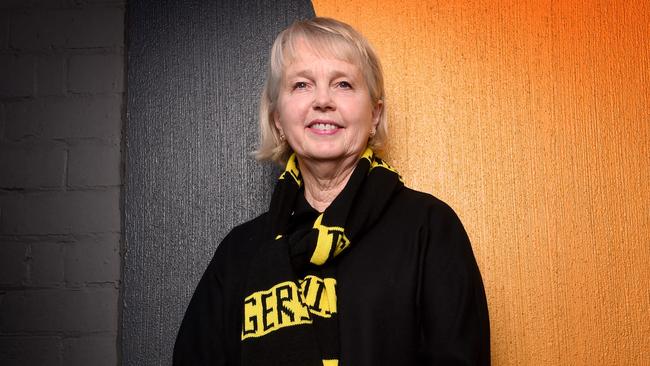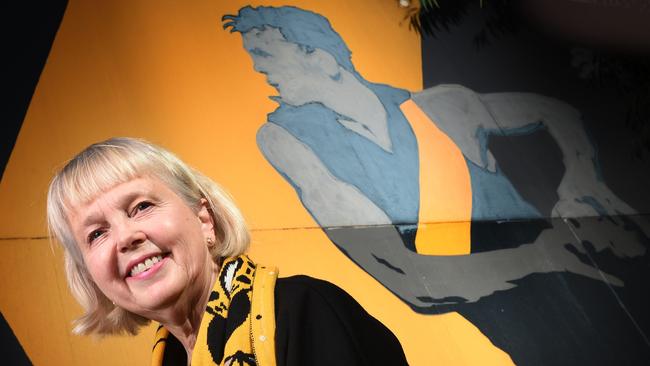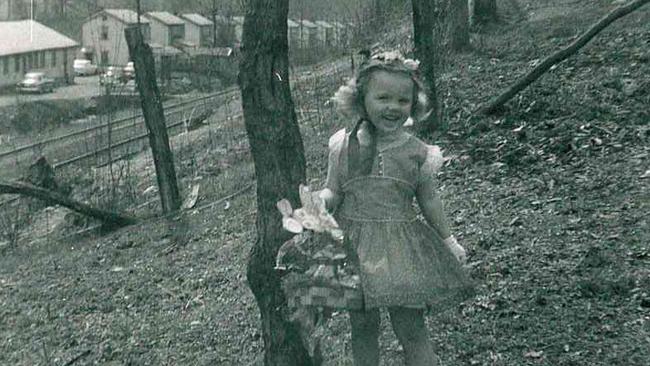Peggy O’Neal: ‘You can’t just buy a premiership, you’ve got to build one’
From a small mining town in West Virginia to the presidency at Punt Road, the AFL’s first female president Peggy O’Neal reflects on the trek to Tigerland and the Richmond resurgence.

Peggy O’Neal was trudging solo around Uluru last August when a group of mountain-bikers pedalled by.
“Somebody yelled out, ‘Peggy — it’s Peggy!’,” the Richmond president chuckled of the Red Centre encounter this week.
“I thought, ‘Oh wow, even here in the middle of the outback’.
“I had a hat on — I mean how did they even know it was me? But you know, you can never get away from Tigerland: there are Richmond people everywhere and good on them.”
As footy’s first female president and leader of the Punt Rd resurgence, she shouldn’t have been surprised at the recognition.
But O’Neal’s football journey is unlike any other.
Born in the remote West Virginia mining town of Killarney in the Appalachian Mountains, O’Neal concedes she knew nothing about Melbourne, let alone Australian Rules.
“It was a coal camp where the company owned all the houses and the coal miners lived in them,” O’Neal says.
“It’s a ghost town now. I remember my dad, before he died, went back looking for our house, but it doesn’t exist anymore.”
The family moved to the bigger town of Grundy, Virginia, where O’Neal went to senior school before attaining a bachelor of arts at Virginia Tech and a law degree at the University of Virginia.

A chance meeting with an Australian backpacker during a holiday in Greece brought her to Melbourne in August 1989.
The couple, since divorced, bought a house in Charles St, Richmond, and O’Neal adopted the Tigers after being captivated by the Save Our Skins campaign.
“We moved to Richmond, when nobody wanted to live in Richmond, and got a bargain. It was around $45,000,” she says.
Requalified at Melbourne University, O’Neal landed a plum job as a commercial lawyer for Freehills at 101 Collins St where she worked alongside ex-Hawthorn player Richard Loveridge.
“He and I still have lunch on the outcome of the Richmond-Hawthorn game … and he has been buying lately, yes,” she says.
O’Neal, 67, attended her first Richmond game in April 1993 with the wife of a colleague and quickly caught the bug.
“It was against Melbourne at the MCG and we lost,” she says.
“Looking back on it, being a new person to the country and especially to Melbourne, it was a way of fitting in.
“It was a really welcoming environment and Richmond wasn’t going so good, so it was easy to get a seat.”
She became a member in 1996 and signed as a player sponsor, looking after Ray Hall, Andy Collins, Daniel Jackson, Ty Vickery, Chris Knights and now Kamdyn McIntosh.
“A couple of people said if you do that, you’ll get to know more about the club,” she says.
“Everyone kept saying, ‘Oh, you should have been here in the ’70s when it was successful, and Richmond always eats its own’. Over time I came to understand what that meant.
“People wanted success very suddenly. It’s easy to say in hindsight, but they thought for a while that success could be bought and that the short term was important.
“Maybe it took a bit of time for everybody to get across the new world — that you can’t just buy a premiership, you’ve got to build one.”

O’Neal joined the board in November 2005 and served under president Gary March, a key driver behind the Richmond revival.
“He certainly did think longer term about the future of the club and try to put in place those foundation pieces,” O’Neal says.
“For a while nobody wanted to come to Richmond to work.”
The arrival of chief executive Brendon Gale, coach Damien Hardwick, list boss Blair Hartley and No. 1 pick Trent Cotchin helped turn the tide.
A kid called Dusty was pretty handy, too.
The pair often share a text on the eve of big matches.
“Dustin ought to be proud of how he has developed,” O’Neal says.
“He always had the football talent, but it took him a little bit of trial and error to find out what really mattered to him.”
While winning big games is important, O’Neal says Richmond now has broader purpose.
She’s a president who gets on with governance and avoids the limelight.
“If you look at these last three years, it’s really started to come together,” she says.
“You have so many moving parts and then things click, if only for a little while.
“There was a long dip — and 37 years was a long time — but nonetheless there does seem to be a strong identification and interest in the club.
MORE NEWS
FANCY A DUSTY HAIRCUT? HERE’S YOUR CHANCE
LAKE OPENS UP ON HITTING ROCK BOTTOM
CONIGLIO MAKES MASSIVE GRAND FINAL CALL
“At first it was because we were doing things that made them proud, even if we weren’t winning on the ground: the work we were doing with the Aboriginal community, the Alannah and Madeline Foundation, gender equity, multiculturalism with Bachar (Houli).
“What Brendon has done is to build an executive team full of good, skilled people who put the club first.
“Damien and the whole football side — it’s just evidence that good people attract good people, and if you get the right people in place in those fundamental roles, lots of good things can happen.”
Originally published as Peggy O’Neal: ‘You can’t just buy a premiership, you’ve got to build one’
